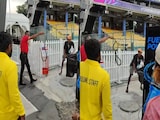The Union Health Ministry has updated its air pollution advisory to all states and districts, under the National Programme on Climate Change and Human Health (NPCCHH). The advisory mandates the creation of CHEST Clinics in all government hospitals and the immediate strengthening of healthcare facilities to tackle air pollution-related diseases.
CHEST Clinics in Every District
All government hospitals, including district hospitals, community and urban health centres, have been ordered to establish CHEST Clinics dedicated to screening, treatment, and follow-up of cardiopulmonary illnesses linked to air pollution. These clinics will identify risk factors, confirm diagnoses, and provide long-term care for patients suffering from respiratory and heart diseases aggravated by poor air quality.
The Health Ministry has also instructed these facilities to maintain detailed patient registers, record cases daily, and report them through a digital system. Each clinic will link with primary and community health centres for continued follow-up and treatment.
Hospitals to Be Strengthened and Staff Trained
All Primary Health Centres (PHCs), Community Health Centres (CHCs) and District Hospitals (DHs) have been directed to ensure adequate medicines, oxygen cylinders, nebulizers, ventilators, and emergency beds are available. Medical officers and paramedical staff will receive specialized training to manage respiratory and cardiovascular cases associated with high pollution exposure.
Hospitals across India have also been asked to serve as sentinel sites, monitoring and reporting daily cases of air pollution-related illnesses such as asthma, COPD, bronchitis, heart disease, and strokes. Data collected will be analyzed by District and State Nodal Officers under the NPCCHH for early warning and response.
Door-to-Door Health Monitoring
The Centre has instructed health workers, including ASHA and ANM staff, to conduct door-to-door surveys to identify vulnerable individuals, especially children, pregnant women, the elderly, and people with pre-existing heart or lung conditions. Workers will advise families on protective and preventive measures, such as avoiding outdoor exposure during poor air quality days, improving ventilation at home, and using cleaner cooking fuels.
Dust Control and Worker Protection
States have been told to ensure strict dust control at construction and demolition sites. Local authorities must ensure water sprinkling, covering of materials, and the provision of masks and protective kits for all workers.
Regular health check-ups and training sessions for construction workers have been made mandatory. Employers are expected to rotate duties to limit prolonged exposure and maintain records of respiratory health monitoring.
Schools and Children's Safety
As part of the advisory, the Centre has recommended that schools up to grade 5 shift to online classes during days of severe air pollution. Schools have been asked to monitor air quality levels daily and suspend outdoor activities when the Air Quality Index (AQI) turns "poor" or above.
Task Forces and Graded Response
State and district-level Task Forces on Climate Change and Health have been immediately activated to coordinate with pollution control boards, education departments, and local authorities. The advisory reiterates that all states must strictly follow the Graded Response Action Plan (GRAP) as notified by the Central Pollution Control Board.
Growing Health Concerns
The Health Ministry has cited a sharp increase in cases of lung and heart diseases linked to pollution exposure. The advisory notes that air pollution affects not only the lungs but also the heart, brain, and nervous system. Long-term exposure, it warns, can lead to chronic illnesses such as lung cancer, strokes, and cardiovascular disease.
The Ministry has urged citizens to stay alert, monitor local air quality through the CPCB's Sameer app, and follow all official health advisories to protect themselves from the rising public health threat.
Disclaimer: This content including advice provides generic information only. It is in no way a substitute for a qualified medical opinion. Always consult a specialist or your own doctor for more information. NDTV does not claim responsibility for this information.















